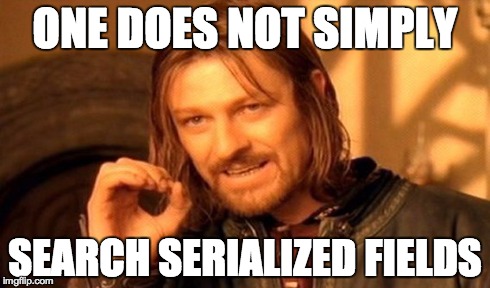In Rails, ActiveRecord allows you store and retrieve data structures like arrays and hashes in a single string or text-type database column through application-level serialization.
It is a common pattern with models having fields like tags or nicknames, where you want to be able to store an arbitrary list of strings:
class Post < ActiveRecord::Base
serialize :tags
end
This is all fine n' dandy until you're like, "I want to find all posts tagged with either 'hobbits' or 'gandalf'!" Well..

The database only knows it has a string, not a comma-separated list of strings. It is possible to search application-level serialized fields, but it's pretty hacky and brittle:
class Post
scope :including_all_tags, -> (tags) { where(matching_tag_query(tags, 'AND')) }
scope :including_any_tags, -> (tags) { where(matching_tag_query(tags, 'OR')) }
private
def matching_tag_query(tags, condition_separator = 'OR')
tags.map { |tag| "(tags LIKE '%#{tag}%')" }.join(" #{condition_separator} ")
end
end
# In use
Post.including_all_tags(['hobbits', 'gandalf'])
Post.including_any_tags(['hobbits', 'gandalf'])
This approach builds a WHERE condition and matches against the given tags, which grows and becomes increasingly inefficient as the number of searched tags increases. Also, if you have tags like gandalf and gandalf-the-grey, you'd get false positives with the above example. While passable for simple cases, there's got to be a better way! Fortunately for us, along comes Postgres.

PostgreSQL Arrays
Postgres has built-in array-type columns, which we can take advantage of in our Rails 4.X apps with the postgres_ext gem. What does this mean for our Rails apps? If we can store arrays in a single database column, then our database and application have the same understanding of the structure of the data. This isn't possible with the out-of-the-box serialization model. Most importantly, we can use SQL to effectively search inside our array-type columns.
With PostgresExt installed, we can add an array: true flag to string/text columns:
class PostgresHaveMyBabiesMigration < Migration
def change
create_table :posts do |t|
t.text :tags, array: true
end
end
end
Now, the model is no longer concerned with serializing the :tags field:
class Post < ActiveRecord::Base
# crickets
end
Searching
As mentioned, one of the primary benefits of Postgres's array-type column is the enhanced searchability through array-specific SQL. The Postgres Extensions gem unlocks a number of array operators and functions for usage in SQL strings. Let's take a look at operators in both their SQL and Arel forms. If you're unfamiliar with Arel, check out this post where I expand on its usefulness.
Overlap Operator
The overlap operator (&&) is useful when you're comparing two arrays to see if they share one or more elements in common.
In SQL:
SELECT *
FROM posts
WHERE posts.tags && '{hobbits,gandalf}'
Utilizing Arel:
Post.where(Post.arel_table[:tags].overlap(['hobbits', 'gandalf']))
# or
Post.where.overlap(tags: ['hobbits', 'gandalf'])
These queries would return any posts having either 'hobbit' or 'gandalf' as a tag.
Contains Operator
The contains operator (@>) is useful when you're looking for arrays that contain all the elements of another.
In SQL:
SELECT *
FROM posts
WHERE posts.tags @> '{hobbits,gandalf}'
Utilizing Arel:
Post.where(Post.arel_table[:tags].contains(['hobbits', 'gandalf']))
# or
Post.where.contains(tags: ['hobbits', 'gandalf'])
These queries would return any posts having both the 'hobbits' and 'gandalf' tags.

Wrapping Up
Postgres is awesome. The array extensions are magical. Instead of application-level serialization, let Postgres handle array persistance for you. It unifies the understanding of array-type data between the database and application and simplifies searching.
没有评论:
发表评论